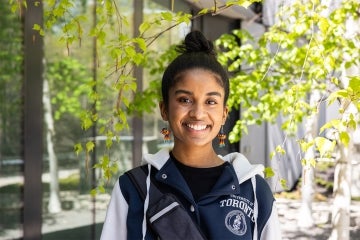‘It just didn’t feel like a reality for me’: U of T grad turns life challenge into academic opportunity

Devo Moosewaypayo played a key role in supporting the Indigenous Students Association at U of T and is considering further studies in Indigenous language revitalization (photo by Polina Teif)
Published: May 26, 2025
The pandemic threatened to disrupt many students’ carefully created academic plans, but for Devonne Moosewaypayo it helped launch them.
A member of the Kinistin Saulteaux Nation – an Saulteaux community in the Treaty 4 territory in Saskatchewan – Moosewaypayo, who goes by Devo, had just moved to Toronto from Calgary in early 2020 to be closer to her then-partner while continuing her work in the food and beverage sector.
But it wasn’t long before COVID-19 shuttered the city’s restaurants, bars and nightclubs – a setback that she turned into an opportunity.
“It gave me that space to really reconsider what I was doing and then have that time and distance from what I was doing to be able to consider something else,” she says.
That “something else” turned out to be an honours bachelor of arts degree in Indigenous Studies from the University of Toronto, which Moosewaypayo will receive at her convocation ceremony on June 19.
Having made the difficult decision to drop out of high school several years earlier, Moosewaypayo entered U of T through the Millie Rotman Shime Academic Bridging Program at Woodsworth College, which was recommended to her by a friend. The program allows students who wouldn’t otherwise meet U of T’s admission requirements to qualify for honours bachelor of arts and bachelor of science programs.
Becoming one of the first in her family to graduate from university wasn’t something that Moosewaypayo had envisioned. Growing up, she says her life was far from stable. She was born in Vancouver, moved to Kelowna, then to Toronto, Winnipeg and Calgary – all before she turned 10.
“My childhood was pretty all over the place … I lived with my mom and my sisters until we were taken into foster care, when I was 10,” she says.
Moosewaypayo attended middle school and high school during this period, but felt she needed to prepare herself financially for the transition out of foster care at 18. “I dropped out of high school so I could focus on working,” she says.
That might have been the end of her educational journey were it not for the Woodsworth academic bridging program – though she was initially wary.
“Some upgrading programs can feel a bit patronizing because you're at this age, but then you're taking Grade 10- or Grade 9-level courses to get your GED or your equivalent to be able to access post sec[ondary education],” she says. “I didn't like any of those programs that I tried to do in the past. It just didn't feel right.”
U of T, however, was different. She says she didn't feel alienated. Before long, she moved into her degree program where she chose to pursue Indigenous studies – and again found herself pleasantly surprised.
“I realized that there's way more to learn in Indigenous studies that's separate from identity,” she says. “It's about politics, it's about history, it's about worldviews.”
She says her academic journey at U of T wouldn’t have been possible without First Nations House, a culturally relevant hub that supports Indigenous students’ academic success, personal growth and leadership development.
The community supported her – and she gave back, taking steps to revitalize the Indigenous Students Association (ISA).
“Devo was one of the first students to consistently show up at First Nations House after [the] U of T community started slowly coming back to campus from the COVID lockdown years,” says Jenny Blackbird, the resource centre and programs co-ordinator at First Nations House Indigenous Student Services. “She was instrumental in bringing life back to the ISA, updating the bylaws, keeping up the ISA social media presence, as well as cooking for – and hosting – bi-weekly ISA lunches.”
Moosewaypayo says she wanted to help other Indigenous students.
“The university is not a place that was built for us to be in,” she says. “It's really important to have that sense of community for students to be able to succeed in completing their degrees, and they can do so with support of community and also just by having more Indigenous friends.”
Looking ahead, Moosewaypayo says she’s interested in pursuing further studies in Indigenous language revitalization but is still figuring out her precise path. For now, she’s focused on receiving her degree, an accomplishment that still feels surreal.
“It just didn’t feel like a reality for me. I feel lucky … sometimes I feel like things work out in ways that you don't expect.”



